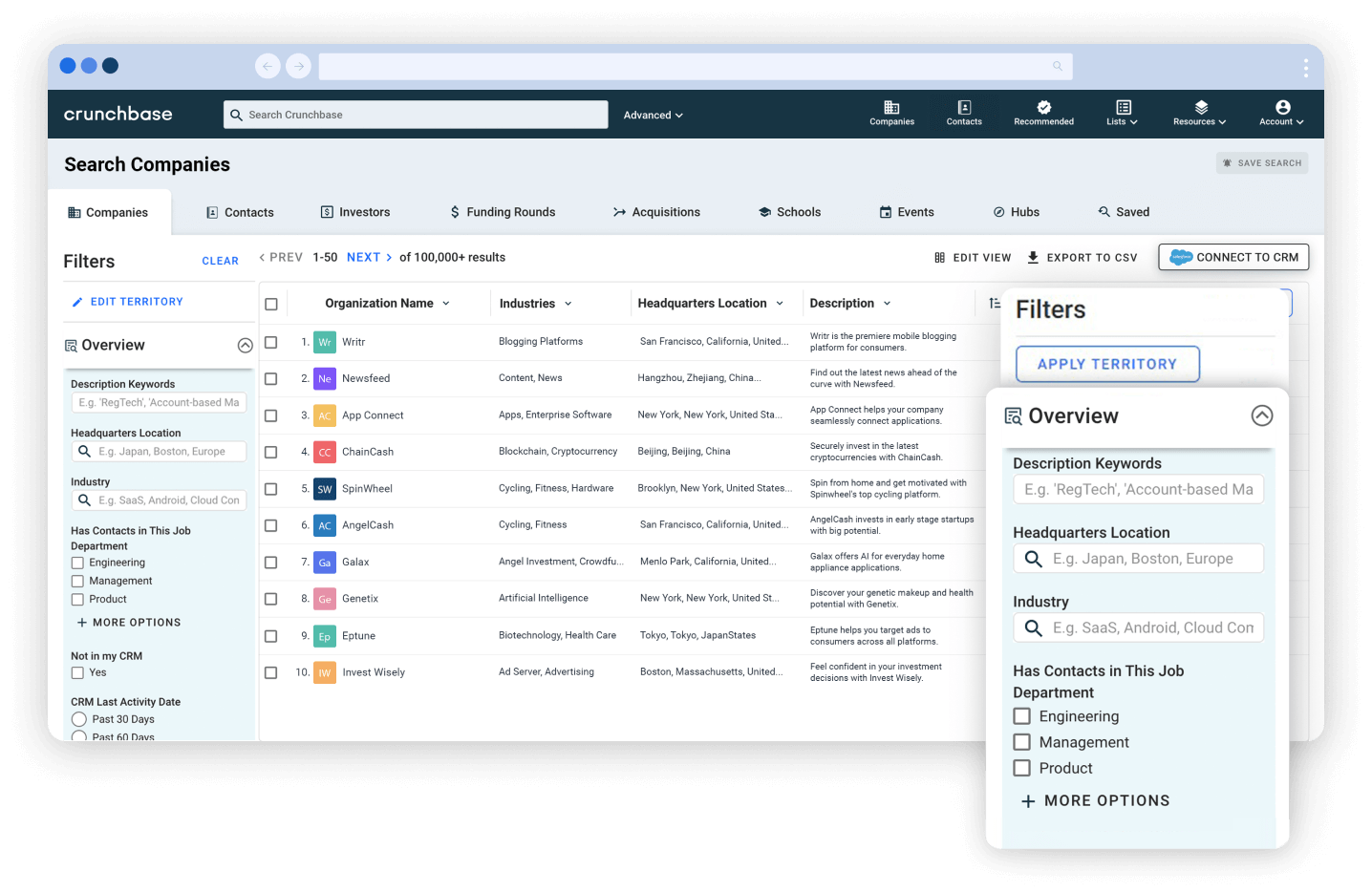Artificial Intelligence News
As of mid-2023, an estimated 1 in 4 venture dollars in the U.S. this year has gone to a startup that incorporates artificial intelligence in its business. That’s especially remarkable considering that a year earlier, it’s safe to say, most people couldn’t name an AI technology — never mind having spent much time using one.
Generative AI applications such as OpenAI’s ChatGPT, Google’s Bard or Microsoft’s Bing started being widely adopted in late 2022, sparking sudden mainstream interest in the potential capabilities of AI to replace or augment humans in tasks from complex problem-solving to creative writing.
On this page, we track all things AI news — from artificial intelligence news articles, to AI business news, to the trends driving this transformative technology forward.
Latest Articles

Former Unicorns Are Bouncing Back From Bankruptcy
British Self-Driving Car Maker Wayve Revs Up With Whopping $1B SoftBank-led Round
Florida Startup Funding Has Stopped Shrinking
Global VC Funding Isn’t Slowing, But It’s Not Growing Either, April Numbers Show
In Sectors From Diagnostics To Spacetech, More Struggling SPACs Are Going Private
The Week’s 10 Biggest Funding Rounds: CoreWeave’s $1.1B Raise Leads Huge Week
The Key To America’s AI Supremacy: Harnessing Global Talent
No Funding Drought For Climate Risk Software Startups
5 Interesting Startup Deals You May Have Missed In April: Firefighting Robots And Animal-Free Eggs
The 10 Biggest Rounds Of April: Xaira And Pine Gate Lead Huge Month Of Megadeals
Eye On AI: After Q4 Slowdown, AI-Related M&A Picked Back Up In Q1
AI Cloud Infrastructure Startup CoreWeave Raises Huge New Round At Reported $19B Valuation
Cyber Firms Island, Corelight Raise Big
Accounting Startups Continue To Tally Up Funding
AI Funding Stays Strong Despite Few Billion-Dollar Rounds
The Week’s 10 Biggest Funding Rounds: Xaira And Other AI Startups Have Huge Week
New Funds Target Out-Of-Favor Startup Sectors
A Wake-Up Call For Sustainable AI Data Centers
IPO Market Insiders ‘Cautiously Optimistic’ That Current Trickle Will Get Stronger
As Americans Spend More Out Of Pocket On Healthcare, Startups See Opportunity
Perplexity Looks To Raise $250M-Plus At Valuation Of $2.5B Or More — Report
The Mixed State Of Startup Funding In 2024, In 11 Charts
The Week’s 10 Biggest Funding Rounds: Metsera And Rivos Headline A Slow Week
Stability AI Lays Off 10% Of Staff — Report
Web3 Venture Funding Bounces Back Slightly From Last Year’s Lows
Frequently Asked Questions
What is AI?
Artificial intelligence, or AI, refers to the simulation of human intelligence by computers and other machines. Increasingly, there are AI applications that can problem-solve, understand and mimic human language, identify patterns, learn and reason.
Advancements in AI technologies in recent years have seen artificial intelligence adopted in industries ranging from health care to investing to manufacturing to national security and defense, and frequently put AI in the news.
But while AI systems have proven themselves adept at specific tasks, these systems have not (yet) become what researchers refer to as artificial general intelligence, or AGI — a hypothetical type of AI as smart and capable as a human that learns from experience, incorporates context into its understanding of the world, and adapts to new situations with acquired knowledge.
What are the biggest AI companies?
Large tech companies that operate in the AI space include:
- Nvidia sells graphics processing unit chips used by generative AI companies.
- Intel and Qualcomm similarly aim to cater to the generative AI chip market and are creating applications for the technology in various industries.
- Google and Amazon play a key role in the AI ecosystem as large language models, or LLMs, rely on immense amounts of data on the cloud to generate text and images. Google and Amazon’s cloud offerings allow developers to build many of the new generative AI applications. Google also is looking to add AI to its massive search operations.
- Microsoft also provides AI startups with the cloud services necessary to build AI tools, but perhaps more importantly it has been a leader in adding AI functionality to many of its business tools, search and other operations. It also has been an active investor in the space — including its massive investment in leading startup OpenAI, which owns ChatGPT.
- Meta produces its own LLMs and is offering free, open-source generative AI alternatives.
- Salesforce and Salesforce Ventures have also been active investors in the space, with the creation of their own generative AI fund. While most associate Salesforce with sales, the CRM giant has been adding software development tools for years and is now using AI in those efforts.
What are examples of AI unicorn startups?
As of mid-2023, there are nearly 200 AI-related companies on The Crunchbase Unicorn Board. They include, among many others:
- OpenAI, an AI research and deployment company that conducts research and implements machine learning.
- Anthropic, an OpenAI competitor with its own chatbot, Claude.
- Databricks, a data and AI company that interacts with corporate information stored in the public cloud.
- Cruise, which builds self-driving vehicles.
- Grammarly, an AI-powered writing assistant.
- Zuoyebang, an online education platform for K-12 students.
- Nuro, which develops and operates a fleet of electric and autonomous vehicles.
- Pony.ai, which builds full-stack autonomous driving solutions.
- Israel-based AI21 Labs, another generative AI competitor to OpenAI and Anthropic.
- San Francisco-based AI research lab Imbue.
- New York-based Hugging Face, which hosts hundreds of thousands of open-source AI models that developers can use for AI applications.
- Adept AI, a machine-learning startup that aims to use AI to help users complete repetitive digital tasks.
- Skydio, a drone startup that uses AI.
What are examples of AI startups working on specific technologies like LLMs or MLOps?
- Developers of large language models that compete with OpenAI’s ChatGPT, Alphabet’s Bard and Meta’s LLaMa include Anthropic, Cohere and AI21 Labs.
- Diffusion model companies for image generation that compete with DALL-E from OpenAI include Hugging Face, Stability AI and Midjourney.
- Synthetic video companies include Runway ML, Synthesia, HeyGen and Pictory, among others.
- Leading vector database startups include Pinecone, Weaviate, Zilliz and Chroma.
- Companies that assist with machine-learning operations include Weights & Biases, Anyscale, OctoML and Arthur.
- Data training platforms including Scale AI, Snorkel AI, Dataloop, Labelbox and synthetic data startup Datagen.
- Other leading AI companies include conversational AI company Inflection AI, human and computer collaboration company Adept AI, AI writing tool Jasper, content creation tool Typeface, synthetic voice platform Character.ai, chatbot AI Ada, and audio and video editing platform Descript.
What is the latest AI technology, the most common types of AI services, and most important concepts within artificial intelligence?
There are many concepts and categories within the broad realm of AI, including:
- Machine learning (ML): A subset of AI that involves the use of algorithms and statistical models to enable machines to learn from data and improve their performance on a task over time. It includes techniques like supervised learning (learning from labeled data), unsupervised learning (finding patterns in unlabeled data), and reinforcement learning (learning through trial and error).
- Neural networks: A class of algorithms inspired by the structure of the human brain. Deep learning is a subset of neural networks that involves complex architectures with many layers, enabling them to automatically learn hierarchies of features from data.
- Natural language processing (NLP): A branch of AI that focuses on enabling computers to understand, interpret and generate human language. NLP technologies power chatbots, language translation, sentiment analysis and more.
- Large language models (LLMs): Advanced artificial intelligence models that can understand and generate human-like text by processing vast amounts of training data. They have applications in natural language understanding, translation, content generation and more, revolutionizing how computers interact with and generate human language.
- Generative AI: Closely related to NLP and LLMs, generative AI refers to a class of AI models and techniques that have the ability to generate new content, such as text, images, or even music, that resembles human-created data.
- Machine learning operations (MLOps): A set of practices and tools that bridge the gap between machine-learning development and production deployment. It involves streamlining the entire machine-learning lifecycle, from data preparation and model training to deployment, monitoring and continuous improvement, to make machine-learning projects more efficient and reliable.
- Computer vision: A field of AI that enables computers to interpret and understand visual information from the world. It’s used in applications like image and video analysis, object detection, facial recognition and autonomous vehicles.
- Expert systems: These are AI systems designed to mimic the decision-making abilities of a human expert in a particular domain. These systems use rules and knowledge bases to make informed decisions.
- Robotics: Integrating AI with robotics to create intelligent machines that can perform physical tasks in the real world. This includes things like assembly line work, surgical procedures and exploration in hazardous environments.
- Artificial general intelligence (AGI): This is a still-hypothetical future AI system that possesses general human-like intelligence, including the ability to understand, learn and apply knowledge in a broad range of tasks, similar to the versatility of human intelligence — and considered by many to be the holy grail of AI.
What are large language models (LLMs) and how do they work?
Large language models, or LLMs, are advanced computer programs designed to understand and generate human-like text based on the input they receive. They work using a combination of techniques from machine learning and natural language processing (NLP).
You can think of them as incredibly smart text generators that use vast amounts of data and complex math to understand and produce humanized text. They’re capable of a wide range of language-related tasks, from answering questions to composing short stories — even poems — and more.
The major LLMs on the market today include OpenAI’s ChatGPT; Google’s PaLM, used in its Bard assistant; Claude, developed by startup Anthropic; and LLaMa, developed by Facebook parent Meta.
Here’s a simplified explanation of how these LLMs generally work:
- Training data: LLMs are trained on massive amounts of text data, including books, articles, websites and more. This training helps them learn the patterns, grammar and vocabulary of human language.
- Neural networks: LLMs use artificial neural networks, which are computational models inspired by the human brain. These networks consist of layers of interconnected nodes (neurons) that process and transform input data.
- Input processing: When you give an LLM some text as input, it processes the text through its neural network. The neural network breaks down the input into smaller parts and learns the relationships among words, phrases and sentences.
- Context understanding: LLMs are designed to understand context. They analyze the words and phrases you provide and consider the surrounding context to generate coherent and contextually relevant responses.
- Probability and prediction: LLMs assign probabilities to different words and sequences of words based on their training. They generate responses by predicting the most likely next word or phrase given the input and the context.
- Generative output: After calculating these probabilities, the LLM generates a response. It doesn’t just regurgitate pre-written text but rather creates new text based on its understanding of the language.
- Iterative process: LLMs often work iteratively, generating one word at a time and using the previously generated words to inform the next word choice. This process continues until a complete response is formed.
- Fine-tuning: LLMs can also be fine-tuned for specific tasks or applications after their initial training. This helps them specialize in particular domains, like answering questions, translating languages, or generating code.
- Feedback loop: LLMs can improve over time through a feedback loop. User interactions and corrections are used to refine their responses and enhance their language capabilities.
How much venture funding has gone to AI startups?
Investments in AI began many years ago. According to Crunchbase data, there has been more than $300 billion invested in over 16,000 companies in the sector from January 2013 to mid-year 2023.
Midway through the third quarter of 2023, our data shows approximately 2,000 companies tagged with AI have received funding totaling nearly $29 billion in 2023.
For our search purposes we used the following parameters in the Crunchbase database: artificial intelligence, as well as the AI subsets of intelligent systems, machine learning, natural language processing and predictive analytics.
Why do venture capitalists invest in AI startups?
VCs have invested billions of dollars into AI startups on the belief that artificial intelligence could usher in a generational change — akin to the rise of the internet three decades ago. Specifically, investors who back AI are interested in the technology’s potential for scale — many believe AI could impact virtually every industry.
“Literally trillions of dollars of value gets created when you have these massive tectonic shifts,” Sameer Dholakia, a partner at Bessemer Venture Partners, told us previously, after his firm had earmarked $1 billion to be invested specifically in AI startups.
What are some of the largest IPOs of AI startups?
Large AI startups that have gone public in recent years include:
- SenseTime — based in Hong Kong, SenseTime is an AI software company that develops tech for facial recognition, medical image analysis, autonomous driving and more.
- Splunk — San Francisco-based Splunk is a search software platform that provides monitoring and troubleshooting.
- Mobileye — a technology company based in Jerusalem that develops autonomous driving technologies and advanced driver-assistance systems.
- UiPath — this New York-based software company makes robotic process automation software.
What have been some of the largest acquisitions of AI startups?
Large acquisitions of AI-related startups include:
- MosaicML, an infrastructure company for training models, was purchased by cloud data platform Databricks for $1.3 billion in June 2023.
- Cruise, a self-driving car technology company, was purchased by General Motors for $1 billion in 2016. The company has since gone on to raise large funds from corporate investors including GM.
- Casetext, an AI legal research tool, was acquired by Thomson Reuters in June 2023 for $650 million.
- Chorus.ai, a conversational AI tool for sales teams was acquired by ZoomInfo for $575 million in July 2021.
What are the advantages of AI?
AI’s proponents say it has the potential to vastly augment and scale human capabilities, giving almost everyone access to unparalleled knowledge, personalized technologies and enhanced decision-making powers.
The venture capitalist Marc Andreessen has argued that “what AI offers us is the opportunity to profoundly augment human intelligence to make all of these outcomes of intelligence – and many others, from the creation of new medicines to ways to solve climate change to technologies to reach the stars – much, much better from here.”
In medicine, AI could potentially analyze medical images like X-rays, MRIs and CT scans to assist doctors in identifying potential abnormalities, improving the accuracy and speed of diagnosis, or greatly accelerate the discovery of new life-saving drugs. In agriculture, AI-driven systems may be able to analyze satellite imagery and sensor data to monitor crop health, predict crop disease outbreaks, and optimize irrigation, leading to better crop yields, reducing malnutrition and starvation rates around the world. In education, children could have personalized AI tutors that evolve and adapt to their learning needs and challenges throughout their childhood and beyond.
What are concerns around AI?
Concerns about the development of AI range from worries about ethics and bias associated with artificial intelligence development, to fears about intelligent systems displacing humans in their jobs. AI critics worry that the technology will cause mass unemployment and greater economic disparity, while AI proponents argue the technology will spur the creation of whole new industries, creating more jobs than it destroys.
Many experts have also raised concerns about AI’s potential to rapidly generate and spread misinformation or be used by bad actors to gain political and social power. Still others are worried about national security risks and the potential for AI to cause more deadly wars.
Some have also expressed concern that we could lose control of advanced AIs and that these systems could turn hostile toward humanity.
In an open letter in March 2023, the Future Of Life Institute, a nonprofit, called for a pause in new AI development: “Contemporary AI systems are now becoming human-competitive at general tasks, and we must ask ourselves: Should we let machines flood our information channels with propaganda and untruth? Should we automate away all the jobs, including the fulfilling ones? Should we develop nonhuman minds that might eventually outnumber, outsmart, obsolete and replace us? Should we risk loss of control of our civilization?”
Signatories of the letter included Tesla and SpaceX CEO Elon Musk, Apple co-founder Steve Wozniak and entrepreneur and former presidential candidate Andrew Yang.
What is generative AI?
Generative AI refers to artificial intelligence systems that have the ability to generate new content, such as text, images or other data, based on patterns and knowledge learned from existing data. These systems use algorithms and neural networks to create original output that can be indistinguishable from human-generated content.
ChatGPT, GPT-4 and DALL-E — all three owned by OpenAI — are examples of generative AI platforms. Other examples of generative AI platforms include Midjourney, Microsoft-owned Bing Chat, Stable Diffusion, Meta-owned LLaMA and Google-owned Bard.
What is artificial general intelligence?
Artificial general intelligence (AGI) refers to a still-hypothetical form of artificial intelligence with human-like cognitive abilities that allow it to understand, learn and perform a wide range of tasks.
An AGI could theoretically adapt to various domains without specific programming. Unlike narrow or specialized artificial intelligence, AGI would have the potential to exhibit general intelligence and problem-solving capabilities comparable to human intelligence.
As of mid-2023, no AI system is advanced enough to be considered AGI.
What are other names for AI?
In the Crunchbase dataset, AI companies are generally also tagged as providing the following:
- Intelligent systems: These gather data from users to suggest next steps.
- Machine learning: A branch of AI that learns through the use of algorithms and data.
- Natural language processing: Technology that uses AI and machine learning to “understand” and respond to human language patterns, and is used by generative AI to produce human-like text.
- Predictive analytics: Technology that collects and uses data to predict and gather insights.
Where can I read AI industry news, AI future predictions, recent AI news, AI news articles and the latest news in AI technology?
All of Crunchbase News’ AI articles and news about the future of AI are added to this page as we report them. Check back here frequently for the AI latest news and news on AI.





![Mar Calendar page being torn off to make way for Apr. [Dom Guman]](https://news.crunchbase.com/wp-content/uploads/mar-apr-2-300x168.jpg)







